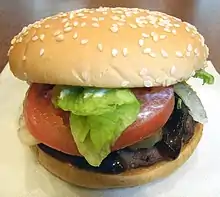Teriyaki
Teriyaki (kanji: 照り焼き) is a cooking technique used in Japanese cuisine in which foods are broiled or grilled with a glaze of soy sauce, mirin, and sugar.[1][2]

Fish – yellowtail, marlin, skipjack tuna, salmon, trout, and mackerel – is mainly used in Japan, while white and red meat – chicken, pork, lamb, and beef – is more often used in the West. Other ingredients sometimes used in Japan include squid, hamburger steak, and meatballs.
The word teriyaki derives from the noun teri (照り), which refers to a shine or luster given by the sugar content in the tare (タレ), and yaki (焼き), which refers to the cooking method of grilling or broiling.[3] Traditionally the meat is dipped in or brushed with sauce several times during cooking.[4]


The tare (タレ) is traditionally made by mixing and heating soy sauce, sake (or mirin), and sugar (or honey). The sauce is boiled and reduced to the desired thickness, then used to marinate meat, which is then grilled or broiled. Sometimes ginger is added and the final dish may be garnished with spring onions) (see tare).
Teriyaki sauce
In North America, any dish made with a teriyaki-like sauce is described using the word teriyaki. This often even includes those using foreign alternatives to sake or mirin, such as wine, or with added ingredients, such as sesame or garlic (uncommon in traditional Japanese cuisine). The sauce used for teriyaki is generally sweet, although it can also be spicy. Pineapple juice is sometimes used, as it not only provides sweetness but also bromelain enzymes that help tenderize the meat. Grilling meat first and pouring the sauce on afterwards or using sweet sauce as a marinade are other non-traditional methods of cooking teriyaki.[1] Teriyaki sauce is sometimes put on chicken wings or used as a dipping sauce.
Variations

A teriyaki burger (テリヤキバーガー) is a variety of hamburger either topped with teriyaki sauce or with the sauce worked into the ground meat patty. Teriyaki stir-fry refers to stir frying meat or vegetables in teriyaki sauce. Another variety is teriyaki-style prepared vegetarian products.
By country
United States
In the city of Seattle, Washington, a large teriyaki culture emerged in the 1990s. As of 2010, there were over 83 restaurants in the city with "teriyaki" in their name. It has been described as the city's signature cuisine by some outlets, noting its widespread adoption as a form of fast food.[3][5]
References
| Wikimedia Commons has media related to Teriyaki. |
- Teriyaki at the Encyclopædia Britannica
- Hosking, Richard (1995). A Dictionary of Japanese Food. Tuttle. ISBN 9780804820424. OCLC 36569289.
- Edge, John T. (January 5, 2010). "A City's Specialty, Japanese in Name Only". The New York Times. Retrieved March 5, 2016.
- "Teriyaki". Glossary. Kikkoman. Retrieved 2014-01-21.
- Kauffman, Johnathan (August 14, 2007). "How Teriyaki Became Seattle's Own Fast-Food Phenomenon". Seattle Weekly. Retrieved March 5, 2016.

